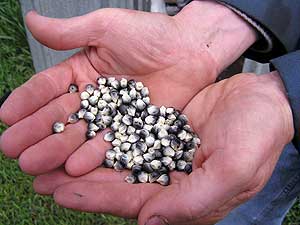|
Audio
Photos
|
May 23, 2005
 |
| John Remmele will grows organic corn from these seeds on his farm near Echo. He's worried pollen drift from neighboring fields threatens the upcoming crop. (MPR Photo/Mark Steil) |
Echo, Minn. — Organic farming is growing, but it's still a tiny part of the food system. In Minnesota less than one percent of the land is in organic production. Though it's small, the sector's been showing impressive gains. Organic food sales in the U.S. have been growing at a 20 percent annual rate for several years. Southern Minnesota farmer John Remmele is one producer who's made the change to organic production.
"I guess I'm quite convinced that organic produce in the end is a lot better than having produce with different chemicals, different drugs in it," says Remmele.
Most of the grain grown in Minnesota is genetically modified, with certain genes spliced in to combat insects or make the plant tolerant of certain chemical pesticides. U.S. Agriculture Department regulations prohibit genetically modified crops from being sold as organic.
So it's distressing for organic farmers when gene altered crops invade their fields.
One avenue is seed. Occasionally a bag of seed accidentally contains kernels which are from a genetically altered variety. Another way is pollen drift. Corn is especially susceptible. Remmele says under the right conditions corn pollen can drift miles.
"I think everyone's getting concerned about the fact that drift's probably in everyone's field. Even if it's only a few kernels in a field it's still there," says Remmele.
It's literally a kernel by kernel process. Each silk on a corn ear pollinates one kernel. Pollen from a gene altered crop, often called GMO's for genetically modified organism, can drift onto the silks of an organic field. Since their genes are dominate in the plant breeding business, any silk touched by GMO pollen produces a kernel of genetically modified corn.
"Basically you could have a cob of corn with just one kernel on it that's GMO and the rest could be all GMO free," says Remmele.
Remmele farms in the heart of Minnesota's corn belt. About 60 percent of the corn grown in the state is genetically altered. Remmele says that includes nearly all his neighbors. He believes unwanted pollen is always present in his fields.
The big question is how much.
The U.S. has not set a standard, but most parts of the world accept trace amounts of GMO material in organic grain. The European Union accepts organic grain as long as it contains less than one percent GMO material. That standard has been adopted by many U.S. food companies. One of the largest organic grain buyers in Minnesota is Sunrich. Kate Leavitt manages the company's international sales division.
"GMO is actually a very big concern for our group and our customers," says Leavitt.
Leavitt says the company checks every truckload of grain it receives for GMO material. She doesn't have exact figures, but says only a handful of trucks were rejected last year. The company buys about 6 million bushels of organic corn a year.
"We certainly do want to be able to offer product that meets the highest level of standards. But I think we can certainly argue that 99-point-some percent is certainly a very high standard," says Leavitt.
Organic farmers can reduce risk by planting genetically sensitive crops like corn as far away as possible from neighboring fields.
Southern Minnesota farmer John Remmele says he's never had corn rejected because it contains too much GMO material.
His big worry is that worldwide organic standards will be toughened. Already South Korea is enforcing a zero tolerance for GMO material in organic food. If that model spreads, organic farmers in the U.S. could lose some big markets.





